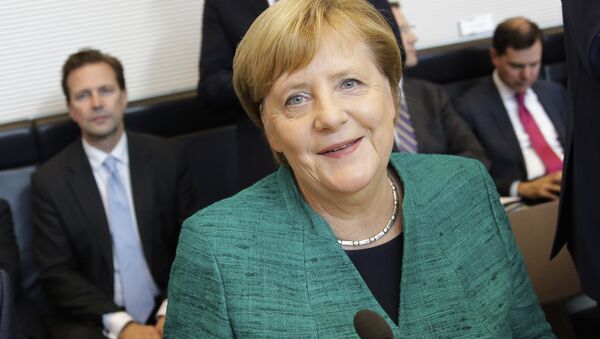German Chancellor Angela Merkel lambasted “isolationism” and “protectionism” along with their devastating impact on global trade, which she referred to as “the very foundations of our prosperity” in her speech at Harvard's 368th commencement ceremony in Cambridge, Massachusetts.
“More than ever, our way of thinking and our actions have to be multilateral rather than unilateral. Global rather than national. Outward-looking rather than isolationist. In short, we have to work together rather than alone”, one of the world’s most influential politicians told the students, noting that they would have different opportunities compared with her generation.
She also warned of the perils that “walls in people's minds” entail, noting that they could divide leaders and hamper responses to global challenges. She called on her audience to break down the “walls of ignorance and narrow-mindedness” between family members, groups within society, people of different skin colours, nations, and religions.
READ MORE: German Media Says German-American Friendship is ‘in Shreds’
At the same time, she praised the leaders who united in the aftermath of the Second World War, saying that she believes that “Europeans have united for the better”.
“The relationship between Germans and Americans too demonstrates how former wartime enemies can become friends”, she added.
She also had her say on damage caused by lies, noting that leaders should not “describe lies as truth and truth as lies”. She advised against acting on the “first impulses, even when there is pressure to make a snap decision, but instead take a moment to stop, be still, think, pause. Granted, that certainly takes courage”.
Although Merkel did not bring up any examples during her anti-protectionism speech, The Daily Mail linked it to her previous criticism of US President Donald Trump’s moves. The incumbent president is known not only for his protectionist measures, but also his commitment to building a wall between the US and Mexico.
Relations between the US and the EU have been strained since last year, following several decisions by the current American administration. In May 2018, the US withdrew from the 2015 Iran nuclear deal, with Washington subsequently re-imposing all previous sanctions and introducing new ones, with a stated goal of bringing down Iran's oil exports to zero, despite opposition in Europe.
Additionally, last year Donald Trump introduced higher steel and aluminium import duties, which evolved into a tariff rift with Europe. The EU then subsequently slapped the US with counter-tariffs on its goods. Trump has for some time been mulling over the idea of using national security concerns as a justification to implement auto tariffs as high as 25%.


